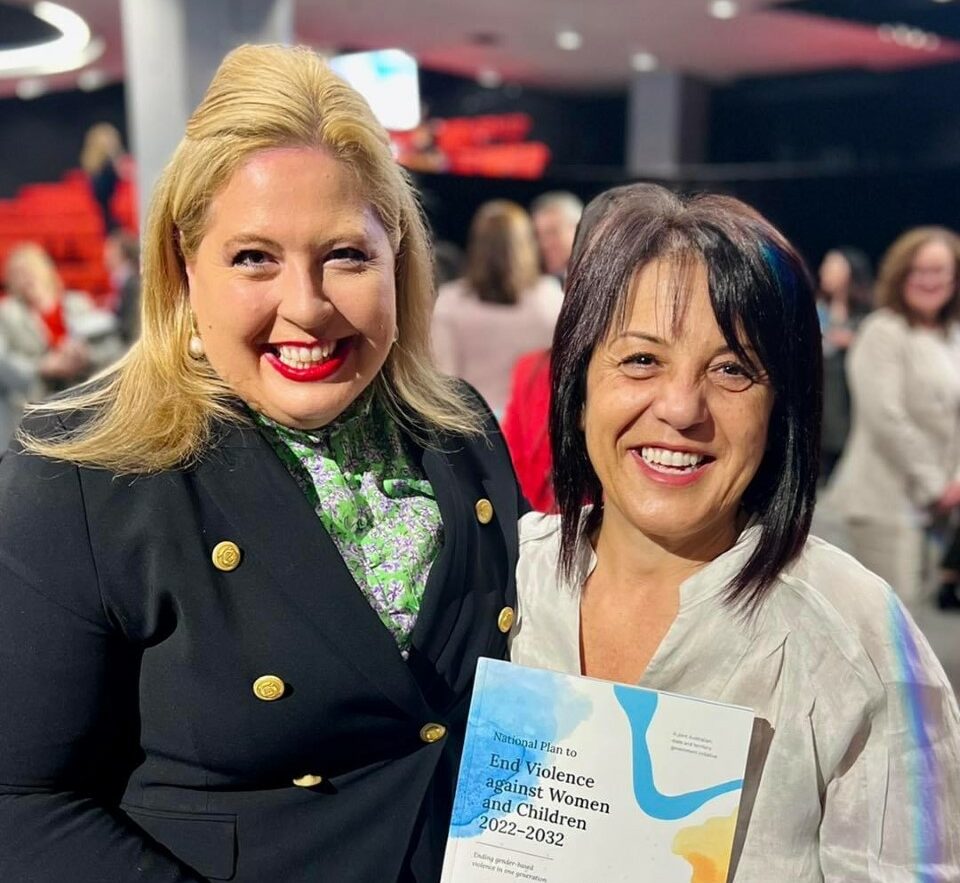The National Plan to End Violence Against Women and Children 2022-2032 was released on Monday, 17 October 2022. Embolden Co-Chair and CEO of Women’s Safety Services SA, Maria Hagias, was pleased to attend the launch in Melbourne as a member of the National Plan Advisory Group, together with Minister for Women and the Prevention of Domestic and Family Violence The Hon Katrine Hildyard MP, DHS Chief Executive Lois Boswell and Office for Women Director, Dr Sanjugta Vas Dev.
This National Plan has been approved by Commonwealth, State and Territory governments, and outlines a pathway to ending gender-based violence across the domains of prevention, early intervention, response, recovery, and healing. It commits to 10 years of sustained action, effort and partnership across sectors and levels of government.
The new National Plan is strongly focused on gender equality as the driver for domestic, family and sexual violence.
Dedicated and strategic national, state and territory actions to implement the National Plan will be outlined in two underpinning 5-year Action Plans, and a dedicated Aboriginal and Torres Strait Islander Action Plan. Development of the Action Plans is underway, with the first five-year Action Plan expected to commence from July 2023.
There was significant consultation across the country and contribution from government, sector and specialist services as well as at the heart of this plan was the voice of victim survivors. They informed and shaped this plan and their collective message was powerful and one that we must have always inform how we do what we do and do it better.
National Plan statement from victim-survivors
It is time to transform our pain into action. There can be no more excuses – that it is too hard, we don’t know what to do, it’s too complex.
It is everyone’s responsibility to end the perpetration of violence against women and children, and all victims of gendered violence.
We are your mothers, your sisters, your brothers, your aunties, your uncles, your cousins, your children, your partners, your colleagues, your friends, your family, your kin, your community.
Do not continue to shame us for what other people have done to us. We did not ask for abuse. We have resisted violence, or done what we needed to do – to protect ourselves, our families. To survive.
Stand with us, do not look away when we show you our pain. See what is happening all around you everyday, from the sexist comment or homophobic joke, to the excuse ‘boys will be boys’.
Discard the intuition that just because you know someone, they could not possibly hurt or abuse another. The people who use violence and abuse against their families, partners, children, colleagues, friends or dates are people you already know. People you like. People you love.
The people who have abused us are people we knew; people we liked; and most often people we loved.
Too many of us are being re-traumatised trying to engage with systems that are meant to ‘protect’ us but fail. Systems that create barriers to access and have costs beyond our means because services are not designed for the realities of our lives. Instead, they perpetuate the same dynamics of power and control as our abusers. Systems that wait until the worst has happened before they respond, then blame us for not reporting or leaving.
We should not have to die to get your attention.
We should never be forced to choose between violence in our homes or being homeless and facing violence on the streets, or having our families torn apart in ways we never wanted and that cause further harm.
This is not safety.
The time is now to remove the inequalities that allow perpetrators to exercise power over others because our society:
- does not believe women
- does not value all women equally
- does not hear the voices of First Nations women and learn from their diverse experiences
- does not reward women equally for work
- does not value women’s unpaid labour
- does not believe children can be trusted to tell the truth about abuse
- does not view people with disability as equal or able
- punishes those who do not conform
- creates disadvantage and poverty as a problem of individuals.
It is time to stop people and institutions choosing to use violence, feeling entitled to control and dominate, to degrade others’ value based on their sex, gender, sexuality or perceived ‘rights’.
We are not damaged goods. We are not incapable or less than you because we experience trauma. We are survivors. We will not be silenced, pushed into the shadows nor spoken for any more.
We hold knowledge and answers that others simply do not.
We are diverse but galvanised by a common cause. We know what needs to change. No meaningful solutions can be made about us without us.
Stopping our suffering depends on all of us choosing to do something differently. We cannot repeat more of the same and expect to achieve change.
Abuse and violence is a problem for victims, but it is not the victims’ problem. Genuine change begins with a willingness to listen. We must stop protecting perpetrators with our silence, and through inaction. We must be willing to sit in discomfort. It is time to be brave.
Members of the Independent Collective of Survivors
